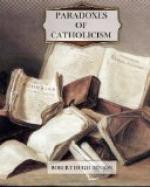II. Now, of course, both these charges were also objected against our Blessed Lord. For He too had His double activities. It is true that there were times when He gave men earthly bread; it is also true that He offered them heavenly bread. There were times when He cared for men’s bodies; there were other times when He bade them sacrifice all that makes bodily life worth living; times when He sat at meat in the house of a rich man, and times when He starved, voluntarily, in the desert.
And the world found Him wrong whichever He did. He was too worldly when He healed men on the Sabbath; for is not the Law of God of more value than a man’s bodily ease? Why can He not wait till to-morrow? He was too worldly when He allowed His disciples to rub corn in their hands; for does not the Law of God forbid a man to make bread on the Sabbath? He was too worldly, too unpractical, too sense-loving when He permitted the precious ointment to be spilled on His feet; for might not this ointment have been sold for much and given to the poor? Is not spirituality enough, and the incense of adoration?
And He was too otherworldly when He preached the Sermon on the Mount. What is the use of saying, Blessed are the Meek, when the whole world knows that “Blessed are the Self-Assertive”? He was too otherworldly when He spoke of Heavenly Bread. What is the use of speaking of Heavenly Bread when it is earthly food that men need first of all? He was too otherworldly when He remained in the country on the feast day. If He be the Christ, let Him be practical and say so!
It was, in fact, on these very two charges that He was arraigned for death. He was too worldly for Pilate, in that He was Son of Man and therefore a rival to Caesar; and too otherworldly for Caiphas, since He made Himself Son of God and therefore a rival to Jehovah.
III. The solution, then, of this Catholic Paradox is very simple. (i) First, the Church is a Heavenly Society come down from above—heavenly in her origin and her birth. She is the kingdom of God, first and foremost, and exists for His glory solely and entirely. She seeks, then, first the extension of His kingdom; and compared with this, nothing is of any value in her eyes. Never, then, must she sacrifice God to Mammon; never hesitate for one instant if the choice lies between them. For she considers that eternity is greater than time and the soul of man of more value than his body. The sacraments therefore, in her eyes, come before an adequate tram-service; and that a man’s soul should be in grace is, to her, of more importance than that his body should be in health—if the choice is between them. She prefers, therefore, the priest to the doctor, if there is not time for both, and Holy Communion to a good breakfast.
Therefore, of course, she appears too otherworldly to the stockbroker and the provincial mayor, since she actually places the things of God before the things of man and “seeks first His Kingdom.”




